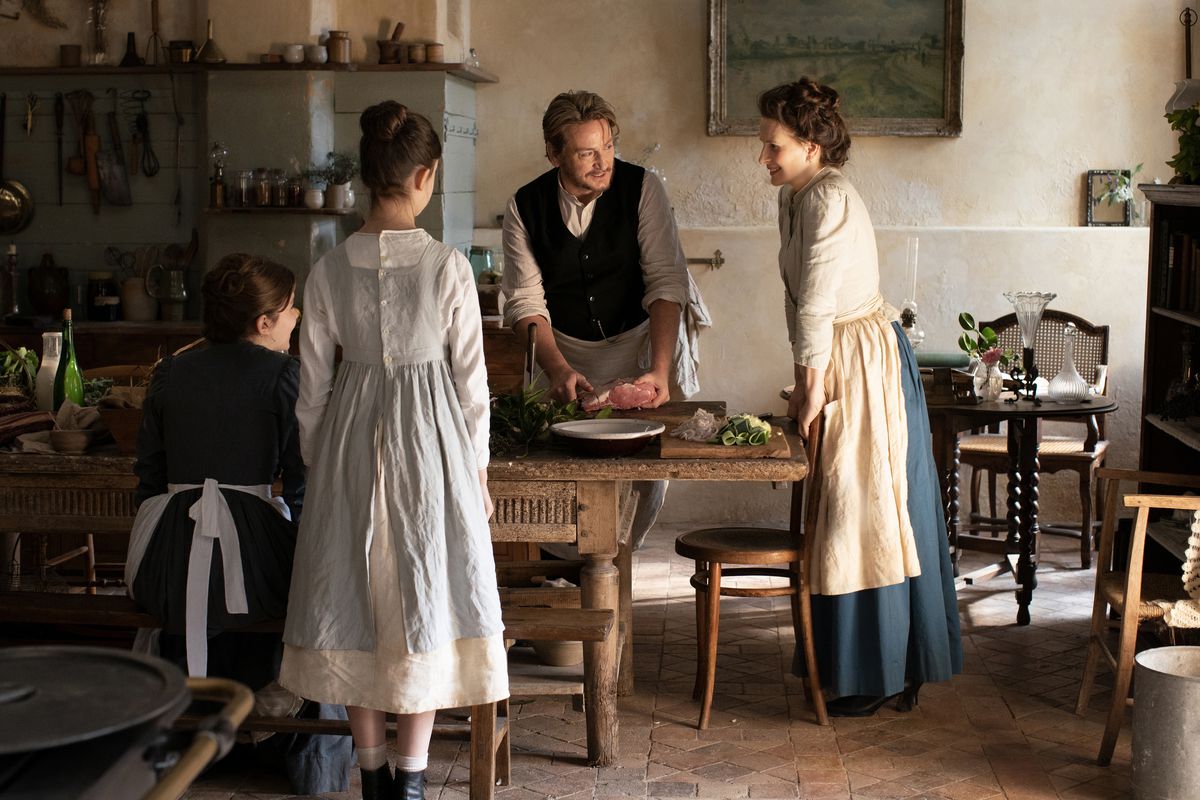Gentle bubbling of broth boiling. Dull thuds of a knife hitting wood. Soft ringing as a ladle scrapes the edges of a pot. A hint of warm sunlight, falling carelessly on a kitchen bench.
The opening sequence of Trần Anh Hùng’s 2023 The Taste of Things (the original French title being Pot-au-Feu) lasts for 38 minutes, and with barely word spoken between them, we meet our lovers: “the Napoleon of French gastronomie” Dodin Bouffant (Benoît Magimel) and his cook Eugénie (Juliette Binoche). In a small, French country kitchen during the Belle Epoque, the audience is enticed in to indulge in culinary decadence. We watch on as Dodin, Eugénie, their kitchen assistant Violette (Galatéa Bellugi) and Violette’s niece Pauline (Bonnie Chagneau-Ravoire) cook and consume.
Inspired by the 1924 novel La vie et la passion de Dodin-Bouffant, Gourmet by Marcel Rouff, the film follows the love story between Dodin and Eugénie, interwoven through food. Dodin and Eugénie are in the “autumn of their lives”, having spent twenty years as partners in the kitchen and in life. The love they share is warm, solid, and comforting, like the broth Dodin brews for Eugénie after a fainting spell. They have simple, upfront conversations about love — Dodin asks Eugénie to marry him (in a way which makes it clear he has been asking for decades), and Eugénie pushes back, establishing early that this relationship is conducted on her terms.
Trần Anh Hùng’s writing and direction allows the story to unfold as organically and decadently as it desires. Each shot is treated with the same tenderness and attention to composition as the dishes: lush, evocative natural scenery; gentle, contemplative pacing that immerses the audience in each domestic scene; intimate lengthy close-ups of faces and hands and empty rooms. The use of natural lighting in combination with meticulous attention to all aspects of cinematography creates veritable visual poetry — the opaque blue-tinged light of an early dawn in the opening scene conveys the coolness and serenity of a morning spent in the garden, without any need for words. For a film that on paper appears so simple, Hùng discovers depths of human emotion that far more complex films fail to appreciate.
That is one of the core messages of the film, and something Dodin strives for; that a simple dish can be just as deep, and rich, and unique, as a gourmet meal. The titular ‘Pot-au-feu’, a traditional French dish of broth, meat and vegetables, comes into play when after having dined with the Prince of Eurasia (an admittedly strange and fictitious title) and consumed a wildly complicated and incoherent menu, Dodin decides to return the favour by cooking the Prince pot-au-feu. All his friends think he must be crazed to offer a Prince something so plain and simple, but a moment of understanding between Dodin and Eugénie elucidates Dodin’s reasoning. It is simple, nourishing dishes that survive for centuries in a culture, just as it is simple, nourishing love that survives for decades between two people.
The parallels drawn between food and pleasure are not subtle, but they are stunning and vivid. In one scene, Dodin and his friends engage in the sinful act of consuming ortolan — a sweet songbird who, in traditional preparation, is gorged on millet seed then drowned in Armagnac — bearing towels over their heads to obscure themselves from God’s wrathful gaze. The men moan in subversive, sensual delight as they stuff their faces with their little luxury, ignited by their irreverent actions.
As the movie progresses, the devastatingly deep love that Dodin has for Eugénie presents itself in his every move: his measured walk up the service stairs to her bedroom, him silently savouring her dishes when dining with his friends, his eyes, constantly searching for her, watching her as she eats, sleeps, and of course, cooks. In one scene, Dodin draws up a chair to watch as Eugénie bathes herself, slowly sponging her skin and allowing the water to sluice down her back. Dodin is entranced, and the fragile adoration present on his face is a testament to Magimel’s integrity as an actor.
The Taste of Things is a movie about love. Love is oozing from every crevice, every spoonful of broth, every kitchen shot grazed by the morning sun, every precious moment taken to savour the art of cooking. It revels in the decadence of time spent cooking, eating, loving; the longer it takes to create something, the more beloved it is to the characters.
I never thought a movie that was two hours of dialogue-light culinary scenes would tear my heart into pieces and build it anew, but watching Eugénie saunter through her vegetable garden, savouring the summer sun on her skin and the ephemeral beauty of the nature all around her — I was her, in that moment, and it was bliss.





